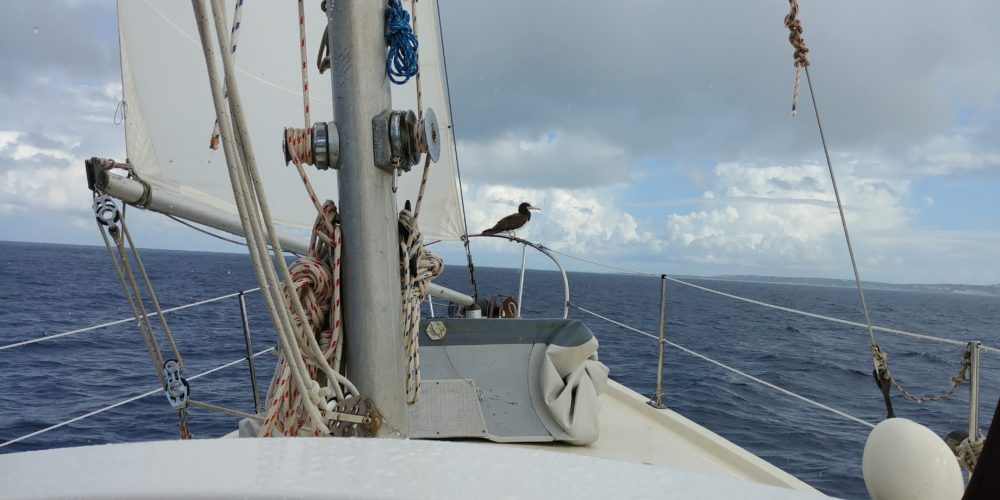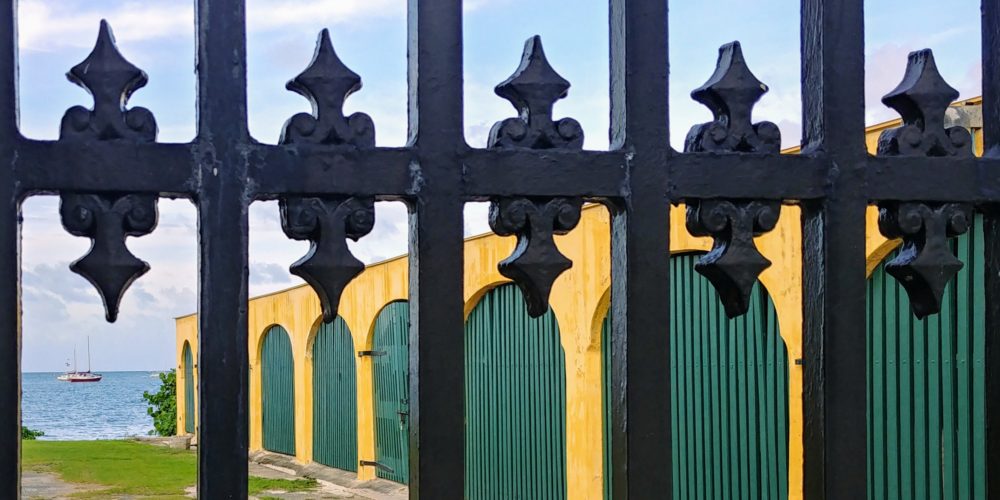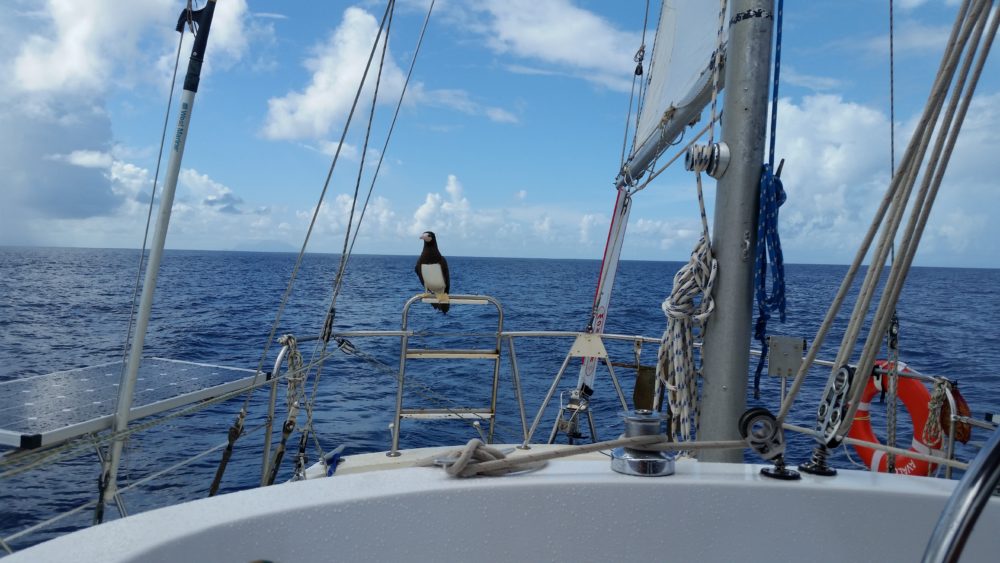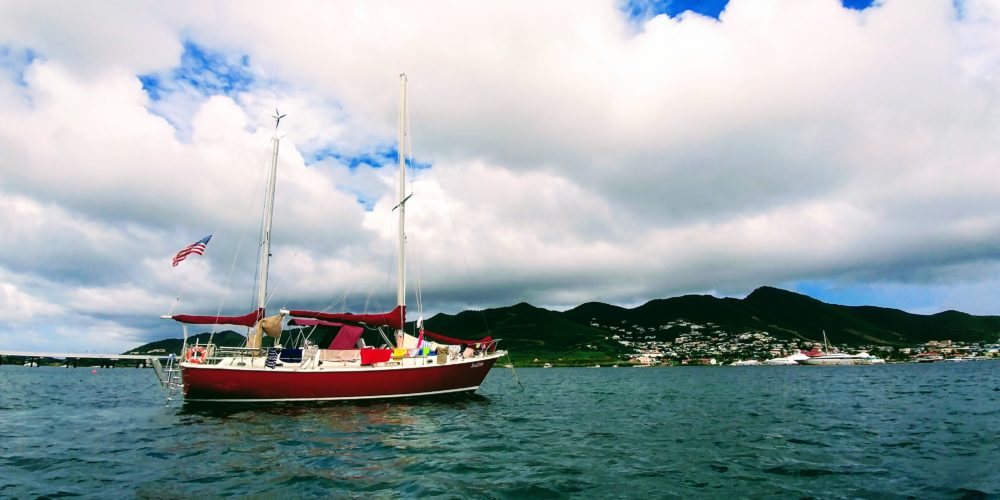Anagada Passage

We’re sipping coffee and listening to French radio on 105.9. To be fair, it’s a French station rebroadcasting here on St. Martin from Martinique, and mostly what they play is a schizophrenic-eclectic mix of our favorite oldies, mixed with favorites we never knew were our favorites, with a sprinkling of some French selections just to remind us we’re visitors here.

A few days ago we departed Christiansted, without having hardly made her acquaintance, but having met folks who knew Vieques and her people well. The sometimes melancholy relationship that Vieques shares with St. Croix can be easy to overlook, until a Boricua kid–absent shirt, shoes, or hat–rides past on the narrow, ancient streets, astride a Paso Fino saddled with little more than a blanket, shouting to his friend in Spanish, and suddenly I smile, briefly forgetting which island my feet are dry on. But only for an instant. St. Croix is not Vieques, nor Puerto Rico. Still, many descendants of Viequense live there now, a flow stretching back three or four generations.
We weighed anchor with a promise from NWS of 6 foot seas and 48 hours of ENE at 15-20 knots – exactly what this old cow of a boat wants for a crossing to the Windward Islands.
As if.
We saw 10 foot seas around the east end of St. Croix with 25-30 knots whistling through our shrouds. Maxwell was so concerned that he started playing on his tablet upside down. Sara took the first watch, but there was little sleep that night aboard Avalon, as she reached as close as her rig would allow, racing and beating to skirt around hourly squalls. So after all the plotting and planning and weather guidance (which I must say has been spot-on for the big atmospheric events) we ended up beating across the Anagada Passage – exactly what I had hoped to avoid by transiting far to the south. Still, we all did well with it, ship and crew.
Saba reared on the evening of the second day, and rounded in darkness, its lights a pearly necklace high in the sky above us as we ghosted in her lee. In the morning an old friend came to roost on our rail as I replaced the engine’s impeller below while Sara made short tacks for the last mile, through an Easterly line of squalls into Simpson Bay. When we fired up the motor we were rewarded with an enthusiastic gush of exhaust water from the transom. Upon entering Simpson Bay, we squeezed in front of Poema, the Dutch Antilles Coast Guard ship, that graciously allowed us to pass beneath the bascule bridge before them.

It’s going on six long years since I was here last. Some things are unchanged: customs and immigration in the police station by the Simpson Bridge giving me a double ration of shit for not having exit papers from the USA (whatever), the dizzying array of international restaurants ashore, the yacht club, the Soggy Dollar, Garden Market, the scuba shop, the garish lights from the casino, the seedy strip-club, and all the
prices still listed in Antilles Guilders (but the Protestant God have mercy on your soul should you try to pay with anything other than green USD on the Dutch side).
Everything else is starkly different, courtesy of Irma. The perennial fleet in the lagoon anchorage inside the waterfront is eerily vacant, with the speed bumps of capsized boats threatening the shallows, and hulls covered with growth from a year submerged, recently floated again. The fingers and docks have been swept clean away from piers, boats now tied extravagantly beam-to between the stumpy remains of pilings. The Juliana Airport – one of the least painful landings in the Caribbean – is shattered and shuttered, the boarding facilities now temporary structures erected in the margin.
Still there are hopeful new sprouts of rebuilding as well. Seth recently opened the Dinghy Dock on the west side of the Dutch lagoon, and that place has tickled our fancy. They even let little Max sit at the bar, sipping his iced mango juice through a cut of natural straw – at least until our food came. Everyone flirts shamelessly with the little man until he creeps out from behind his mother’s dress to give a fist bump (or a hug and a kiss as tradition and social convention requires).
Much to our delight, Dinghy Dock has a selection of “leftover beer” for cheap fucks like us—the last few cans of a craft run they no longer carry, or that are a bit past their prime (dealer’s choice; no complaining!)—and we were blissfully surprised when some quality brew got pushed in front of us for $4.
The Juliana bridge now divides the lagoon, a raised maritime frontier between France and the Netherlands, erected with the wistful hope of relieving the unimaginable traffic congestion over the hill to Philipsburg. I would prefer to simply motor across the narrow half-mile in darkness, avoiding the inevitable customs mess of check in (and out) as I did routinely years ago, but with the necessity of radioing the swing bridge, we’d be on their crossing list – an inconvenience exacerbated by the non-functional Sandy Ground bascule bridge west of Marigot on the French side. The days of quietly crossing over water between countries on St. Martin are over – at least for now.
Tomorrow we’ll look to rent a car to visit the French side and take on cheese and wine with the hope of a strongish dollar which our administration has not quite managed to tank against the Euro. Yet.
A deep, aggressive tropical wave passed over us yesterday, keeping us on casual anchor-watch in this poor holding and collecting enough rain to thoroughly wash every article on the boat this morning after filling our tanks. Max and I stomped the wash into soapy water that collected ankle deep in the dinghy overnight. This ritual of cruising is a return to roots of sorts. Our lines are adorned with cruiser’s pennants; our clothes pinned beneath a drying breeze. All is somehow right in our world in spite of all the wreckage bearing mute witness to the contrary.

Sara wants to make landfall on an island that hasn’t (recently) suffered a Cat 5 hurricane and remains innocent of the chaos and disorientation that follows for years. I wish it too. I’m tired of saying “It used to be like…” and “I have no idea what we’ll find now.”
It isn’t adventurous; it’s become morbid.
Lurking in the near future looms our turn-around date to return to our own torn island. I wake sometimes dreading the prospect of a high season that never materializes on Vieques. I worry the scant aid we received dries up from indifferent, and at times openly hostile local and federal governments. It’s a thin thread that keeps us from descending back into dark nights and our airport and pier silent and empty for want of tourist traffic to service.
There is still time now to press on to the south where storms rarely touch and the water stays warmer all year long.